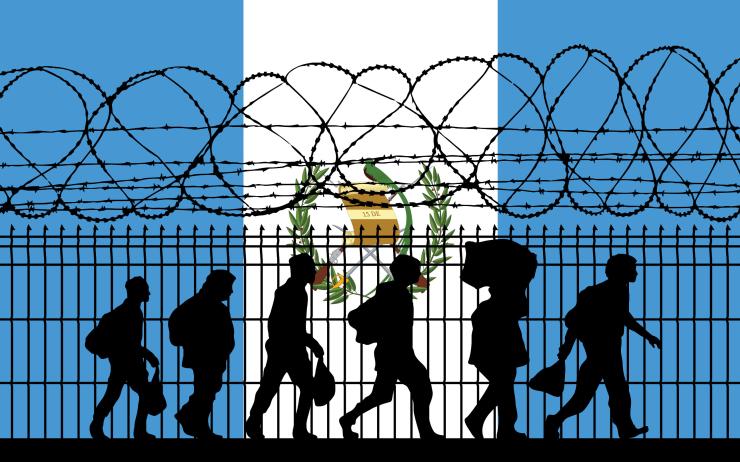Migrants.

Among the many problems afflicting Guatemala, there is certainly also the migratory phenomenon.
In fact, Guatemala, in addition to being the country of origin of large numbers of migrants heading to the USA, is also, due to its geographical position, a transit route for those leaving from other states both in Central America and in the southern area.
According to some estimates made in 2021 by the IOM (International Organization for Migration), around 31,000 people try to leave the country every month to cross the border with Mexico. Generally, the majority of migrants, about 60%, leave from Honduras, 17% from Haiti and 12% from El Salvador. It has also been estimated that 46% of people attempting crossings are women. In recent months there has also been an increase in departures from Nicaragua, Cuba and Venezuela.

Around 31,000 people try to leave the country every month to cross the border with Mexico. (Photo IOM).
The weak structure on which the country rests and the atavistic criticalities with which it lives have not allowed it to deal adequately with the pandemic situation. The impact of this has accentuated the crisis situation, drastically affecting the weakest groups deprived of adequate care by the health system which was already quite fragile.
In addition to the pandemic, there were also the hurricanes Eta and Iota which hit Central America in November 2020, causing significant damage to the agricultural sector and the communities dependent on it, as well as numerous displaced persons who facilitated the circulation of the virus during the pandemic period. In the same year, the approval of a controversial budget law, with huge reductions in education and health care and the possible aiding and abetting of companies linked to the government, sparked large protests in the country, up to the request for the resignation of the entire executive. These dynamics have once again worked in favour of the now atavistic internal divisions, despite the great commitment made by the United Nations and other members of the international community. The burden of the lack of a shared historical memory of what happened in the past and in particular of the crimes committed against indigenous communities, still weighs on the population. In recent years, in particular, there has been a phenomenon of aggregation of original peoples, marginalized and protagonists of misery who, despite having always organized themselves in communities and supported each other, are acquiring an ever-greater space in the national political arena by placing themselves today as protagonists in the promotion of protests against corruption.

Journalist José Rubén Zamora Marroquín was arrested on July 29, 2022 for exposing the corruption cases of the Alejandro Giammattei government. Photo: El Periódico
The fracture present within the country is also evident from the repressive climate that has arisen and which led in July 2022 to the arrest of one of the most important journalists in the country, José Ruben Zamora. One of the greatest critics of the Giammattei government, from the columns of his newspaper El Periódico, he published weekly inquiries into the corruption of the country’s political class. In the opinion of some analysts, this arrest is part of a larger mosaic aimed at putting those in the country who oppose the phenomenon of corruption, out of the game.

The indigenous leader Thelma Cabrera. CC BY-SA 4.0/Carlos Sebastián
From a legal point of view Guatemala, according to the Constitution drawn up in 1985, is a presidential republic whose head of state is elected for a four-year term. Next June 23, the country will once again be grappling with general elections for the election of the President of the Republic and his deputy. On the same day, 160 deputies who will go to Congress, 340 mayors and the 20 deputies who will go to the Central American Parliament will also be elected (the latter is a political institution dedicated to the integration of Central American countries, including the Dominican Republic, to bring about the unity of this region and the prosperity of its peoples).
The indigenous leader Thelma Cabrera will again be in the field as the candidate of the Movement for the Liberation of Peoples (MLP), which is a leftist formation and fights for the creation of a plurinational state based on the different Mayan peoples who inhabit the country. Cabrera will be accompanied by former Guatemalan human rights prosecutor Jordán Rodas, having held that position between 2017 and 2022, who will run for the vice presidency.
In late January 2023, Guatemala’s Supreme Electoral Tribunal (TSE) blocked Cabrera and Rodas from participating in the upcoming election, which will be held on June 25.
Guatemalan social movement activists and international observers have reported that the TSE is deeply politicized and acts in the interests of Giammattei and the country’s powerful oligarchs.
Cabrera and her MLP party filed an appeal, but on February 2, the TSE ruled against them, officially banning them from the race.
The Guatemalan electoral authority claimed they cannot run because their application was “invalid”.
Cabrera shared the completed paperwork on Twitter, insisting that “we fulfilled all the legal requirements”. Rodas also explained that he submitted all the required paperwork, and a review of his record found no legal cases or complaints against him.
“Any additional requirement is not found in the law; it cannot be invoked to avoid my candidacy and violate my right to be elected”, he said. (Open Photo: 123rf.com)
Filippo Romeo



